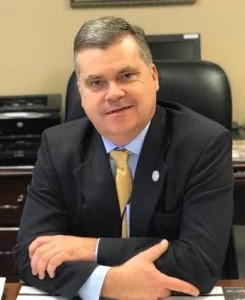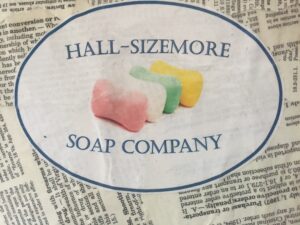
Del. James Edmunds (R-Halifax)
by Dick Hall-Sizemore
Several years ago, officials in Halifax County were confronting the problem of what to do about the local high school. There was consensus that something needed to be done. The only question was whether to make extensive renovations or build a new one. Depending on the option selected, the price tag was estimated to range from $88 million to $100 million.
The debt service on either amount would have been significant, especially for a county with a median household income of $42,289, ranking it 105 out of 132 jurisdictions. At the behest of his home county, Delegate James Edmunds, R-Halifax, introduced legislation (HB 1634) in the 2019 Session of the General Assembly that would have authorized any locality, subject to approval in a local referendum, to increase its local sales tax, with the additional revenue earmarked for school renovation or construction. As was common with such legislation, the bill morphed from one of general application to being applicable only to Halifax County and with a cap of one cent on any increase. The bill was reported out by the House Finance Committee on a 13-8 bipartisan vote and passed both houses with strong bipartisan votes (77-23, House; 29-11, Senate).
In 2020, Edmunds was back with HB 1631 to provide the same authority to another county in his district, Charlotte. The word had obviously spread among counties because the Republican delegates representing the districts to the east and west of Edmunds’ Halifax County introduced similar legislation. Delegate Thomas Wright put in HB 200, which extended the option to Mecklenburg County, while Delegate Danny Marshall’s HB 486 provided the authority to Henry and Pittsylvania Counties and the city of Danville. Before it ultimately passed, the list in Marshall’s bill had been expanded to include Patrick and Northampton counties. Some Senators also got into the act with Senator Lynwood Lewis, D-Accomack, putting in SB 1028 for Northampton County and Senator Tommy Norment, R-James City County, introducing SB 224 for Gloucester County.
Because none of these affected all local governments, they fell under the definition of “special” legislation. The state constitution requires a 2/3 majority vote in each house for the passage of special legislation. Therefore, a strong bipartisan vote in the House (at least 67 votes) and Senate (at least 27 votes) was required. The number of votes actually cast in the House in support of these bills ranged from 70 to 79. In the Senate, on a few occasions the number of affirmative votes fell a vote or two short of the required two-thirds, but, upon reconsideration, the necessary votes were acquired.
In summary, on July 1, 2020, eight counties and one city had the option to increase their local sales tax by one cent, subject to approval in referendum, to help pay for school renovations and construction. The most relevant aspects of that law bear emphasizing:
- Optional—Any increase in the local sales tax is optional on the part of the locality.
- Referendum—The governing body does not have the authority to increase the tax unilaterally. The increase must be approved in a local referendum, initiated by resolution of the governing body.
- Limited—The sales tax cannot be increased by more than one cent. If enacted, it would not apply to the sale of groceries.
- Earmarked—Revenue earned from the one cent increase can be used only to pay costs associated with school renovation and construction. It cannot be used for ongoing operating costs.
- Special fund—The revenue from the tax increase is deposited into a special fund.
- Expiration—If the capital projects for school renovation or construction are financed by bonds, the additional tax shall expire when the bonds are paid off. If bonds are not used, the tax shall expire no later than 20 years after it was authorized.
It should also be noted that, except for Danville, all the localities authorized to exercise this option are rural counties and, further, that with the exception of Northampton, all are represented by Republicans, who sponsored the needed legislation.
Halifax County was the first to take advantage of this legislation. In the fall of 2019, the year the first bill passed, 70% of the county’s voters in a referendum approved increasing their sales tax by one cent. To fully appreciate this margin of approval, one needs to realize that Halifax County is not a hotbed of “tax and spend” liberals. To the contrary, it is a deep red locality. Donald Trump got 57% of its votes in both 2016 and 2020 and Glenn Youngkin got 64% of the vote in 2021.
Last fall, there were similar referenda in neighboring Pittsylvania County and the city of Danville. It easily passed in Danville with 60% of the voters approving it but was defeated in Pittsylvania by 23 votes out of 25,479 votes cast.
Edmunds came back this year for a third bite at the apple with HB 63, adding Prince Edward County to the list of localities authorized to have a referendum on raising its sales tax to cover the costs of school renovation and construction. Delegate Sally Hudson, D-Charlottesville, joined in with HB 545, adding Charlottesville to the list. After a statute that initially provided an exception for a single locality has been amended to add more localities to the list and more keep requesting to be added, the General Assembly often adopts the attitude, “Aw, what the hell? We have let these other localities do this and the world hasn’t come to an end, so let’s allow all of them to do it.” This was the purpose of another bill by Hudson (HB 531) and one (HB 1099) from Delegate Dave LaRock, R-Loudoun.
They all hit a brick wall. A subcommittee of the House Finance Committee, consisting of five Republicans and three Democrats, struck LaRock’s bill from the docket at his request and then proceeded to kill the other bills on a straight party line vote of 5-3.
There is another bill that would give all localities this option. The Senate has passed, 28-12, SB 472, introduced by Senator Jennifer McClella, D-Richmond. Considering the fate of the House bills, however, the future of the Senate bill is pretty dim.
In summary, five members of a subcommittee killed efforts to allow localities to help themselves pay the costs of renovating and constructing schools. Those localities will have to hope that the $500 million in general fund appropriation that then-Governor Northam recommended for this purpose is included in the final budget bill. Of course, with construction costs being what they are, that $500 million will not go far.
There is one other aspect of this story that deserves some attention. In the 2019 and 2020 sessions of the General Assembly, a total of seven bills passed that provided some localities the option of raising their sales tax for the purpose of covering school renovation and construction costs. Delegate Roxann Robinson, R-Chesterfield, voted for each one of them. For the 2022 Session, she was appointed to the House Finance Committee for the first time, and, moreover, appointed to chair the committee. As the committee chair, she is a member of each subcommittee of the full committee. When the local-option sales tax bills came up in subcommittee, she was present and voted to kill each one. It is evident that the Speaker, Todd Gilbert (Shenandoah), who voted against all such bills in the past, had a “come-to-Jesus” meeting with Robinson before her appointment.
My Soapbox
The subcommittee took up Edmunds’ and Hudson’s local-option sales tax bills at a meeting that began at 7:30 on a Friday morning. The subcommittee heard from the patrons and a large number of other people wishing to speak to the bills, both in-person and virtually. Some speakers represented organizations such as the Virginia Association of Counties, the Virginia Municipal League, and various education-related groups. Most of the speakers were private citizens, speaking for themselves. No speaker expressed any opposition to the bills. During the testimony, only one question or comment was made by any member of the subcommittee. (Robinson asked Edmunds about the status of the referendum in Halifax County.) When it came time to vote, Delegate Nick Freitas, R-Culpeper, made a motion to “lay the bill on the table” for each bill. Under the House Rules, such a motion is nondebatable. So, without any debate or comment, five Republicans summarily killed the bills. One would think they would have at least had the courtesy and decency to explain to those citizens why they were opposed to giving them the right to tax themselves.


